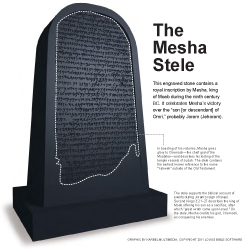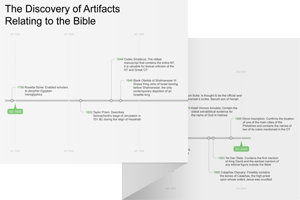16:1 Send a ram Moab, in distress, sends a gift to Judah along with a request for asylum. Referring to Judah as the “ruler of the land” acknowledges the Moabites’ past status as subjects of Israel. See 2 Kgs 3:4–8.
the mountain of daughter Zion Jerusalem. See note on Isa 1:8.
16:2 like a bird fleeing from a thrust away nest The refugees are weak and defenseless—they are women seeking shelter.
at the fords of Arnon The Arnon River, the primary river in the region, formed a large canyon that created a natural boundary for Moab. It would have presented a difficult obstacle for fleeing refugees to bypass.
16:3 “Bring counsel The daughters of Moab appeal to standards of social justice in requesting protection in Zion. Their request is found in Isa 16:3–4a, Isa 16:4b begins God’s response.
16:4 Let my outcasts of Moab dwell as aliens among you In the book of Ruth, a family from Judah sojourns in Moab during a famine (see Ruth 1:1–4). In 1 Sam 22:3, David leaves his parents with the king of Moab. As distant relatives, the Moabite refugees may have expected a reciprocal welcome.
oppressor is no more Yahweh later laments over their plight. Here, He simply defers their plea until the Messiah comes to hear it. The time when all the nations come to Zion has not yet arrived; they are too early (see Isa 2:2–4).
16:5 in the tent of David The Davidic Messiah. See note on v. 4.
16:6 the pride of Moab Pride is again the besetting sin of all peoples. See 2:11–12; 10:12; 14:10.
16:7 Kir-hareseth A city in south central Moab.
16:8 Heshbon withers the fields Focuses on the physical and economic ruin of the northern part of Moab. Heshbon was a city near the northern border of Moab. Sibmah
was a city near the northern border of Moab. Sibmah was likely in the same general region as Heshbon. See 15:1 and note; and 15:4 and note.
was likely in the same general region as Heshbon. See 15:1 and note; and 15:4 and note.
rulers of nations The oracle never explicitly identifies the invaders, which allows the prophecy to be applicable in future eras. As long as the nations failed to acknowledge Yahweh’s supremacy, judgment was a continuous possibility. Ultimately, the nations would not acknowledge Yahweh until the messianic era dawned.
16:9 I weep with the weeping of Jazer for Yahweh empathizes with Moab in vv. 9–11, even though He is responsible for bringing the destruction (v. 10). See 15:5.
Jazer A city north of Heshbon. Sibmah was in the same region. Both Jazer and Heshbon are part of the land allotted to the tribe of Gad in Josh 21:39.
Heshbon and Elealeh Cities in the northern part of Moab’s territory that may have been built by Israel (Num 32:37) See note on Isa 15:4.
16:10 joy and gladness are taken away Similar language appears in Jeremiah’s oracle about Moab (Jer 48:33). Oracles against the surrounding nations appear frequently in the prophetic books, and often share similar motifs and themes.
in the vineyards no one exults See Isa 5:1; Judg 9:27.
16:11 my heart The Hebrew term here refers to the belly, which is associated with emotions in Hebrew. Translations may render it as “heart,” the part of the body associated with emotions in English. A colloquial rendering preserving the belly association might be “my gut ached for Moab” or “my stomach trembled.”
16:12 it is weary upon the high place The lament over Moab begins and ends with a thematic inclusio (a bracketing by repetition) focused on the futility of worshiping any gods but Yahweh. See Isa 15:1–2.
any gods but Yahweh. See Isa 15:1–2.
16:13 the word that Yahweh spoke A short prose appendix is added to what was expressed poetically. The introductory phrase marks this as new and more immediately relevant information.
16:14 In three years Moab’s destruction is imminent and will occur in a few years’ time. This may refer to the Assyrian campaigns that came around 715 bc.
the years of a hired worker Isaiah uses this expression again in 21:16.
all of the great multitude The great multitude is contrasted with the remnant that will be few and feeble.
the remnant Usually only Israel is assured a remnant. See 10:22.
See 10:22.

|
About Faithlife Study BibleFaithlife Study Bible (FSB) is your guide to the ancient world of the Old and New Testaments, with study notes and articles that draw from a wide range of academic research. FSB helps you learn how to think about interpretation methods and issues so that you can gain a deeper understanding of the text. |
| Copyright |
Copyright 2012 Logos Bible Software. |
| Support Info | fsb |
 Loading…
Loading…



